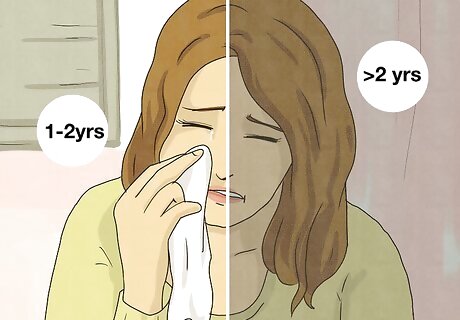
views
Denial

You might experience shock, disbelief, or numbness initially. When dealing with loss, it can be hard to accept what actually happened as a true fact. Some grieving people also act completely normal, like their life hasn’t changed at all. This is because they haven’t accepted what’s happened yet. A person in denial may make remarks like “This isn’t real” or “You must have misunderstood.” Denial is actually your brain’s way of softening the blow. Experiencing all your grief at once may actually be worse than denial.
Anger

The pain from grief can turn into frustration or anger. This usually follows the denial stage once a person realizes they can no longer reject what’s happened. If you’re grieving, you might feel angry at your friends, family, inanimate objects, or even yourself. You could also feel angry at the person who you lost since they are causing you pain. People in the anger stage of grief often say things like, “Why me?” or “What did I do to deserve this?”
Bargaining

You may try to make a deal with God or the universe. If you’re the one grieving, you might find yourself saying things like, “If you bring him back, I’ll never take my family for granted again.” This stage is usually fairly short, and you may find yourself switching back to denial before moving on. New research also shows that the bargaining stage may come with a loss of your sense of self. Since grief tends to shake your faith in everything you know, you may start to wonder who you are without this person or why you exist.
Depression

Deep sadness usually follows after bargaining. Enough time has passed that the grieving person can reflect upon their loss and realize how it’s affected them. During the depression stage, you may have problems with your appetite, emotional outbursts, and physical symptoms, like headaches and stomach aches. During the depression stage, your life may feel empty or meaningless. It’s important to reach out to friends and family members to maintain your connections and realize that you’re still living. Sometimes, people remain in the depression stage of grief for a long time. If your depression is affecting your daily life, talk to a mental health professional. Researchers note that “depression” may be too harsh of a word for the grieving process. This stage can range from clinical depression to simple sadness.
Acceptance

This stage happens slowly, often taking up to a year. The acceptance stage of grief doesn’t mean you think the loss was okay—rather, it means you’ve found ways to cope with it and you can live your life comfortably. You might have hope for the future and believe that you can move past your loss without dwelling on it. Acceptance is usually seen as the final stage of grief, but it’s common to go back and revisit some (or all) of the other stages during acceptance. Grief isn’t linear, and everyone’s journey is different.
Types of grief

Common grief and complicated grief are the 2 main types. Common, or acute grief, describes a grief process that resolves within 1 to 2 years. Complicated, or prolonged grief, may last much longer than 2 years, and the symptoms are usually persistent and long-lasting. Studies show that around 15% of people experience complicated grief. If your grief process lasts longer than 1 year, experts recommend talking to a mental health professional.
Coping with grief

Try to live your normal life as best you can. Although it might feel impossible now, sticking to a general routine is the best way to get your body and your mind back on track. Exercise daily, eat well, go outside, and get at least 8 hours of sleep. The more you take care of your body, the faster you’ll heal. One small thing that really helps is getting dressed every day. Even if you aren’t leaving the house, get out of bed, take a shower, and put on real clothes. It will make you feel better and get you ready for the day ahead.
Treating grief

Lean on your support network while you grieve. Your friends and family members can be there for you in your time of need. Reach out to them and try to spend a lot of time with others as you go through the grieving process. There’s no set timeline for how long grief might last, so don’t feel like you have to rush anything. If you need additional support, reach out to a mental health professional to talk about what you’re going through and treat your grief. It’s common to try and isolate yourself while you grieve; however, this can actually prolong the grieving process and make it harder to heal.
Experiencing grief

You might not follow the 5 stages of grief exactly, and that's okay. The 5 stages of grief were proposed by a psychiatrist named Elisabeth Kübler-Ross in the 1960s, and are a general guideline. Experts in the field agree that grief is a very individual process, and not everyone will go through all 5 stages in order (or all 5 stages at all). As you learn about the 5 stages of grief, keep that in mind, and don’t hold yourself or anyone else to these standards. Grief also looks very different in other cultures. You might grieve one way, but a person from another country might grieve completely differently.




















Comments
0 comment